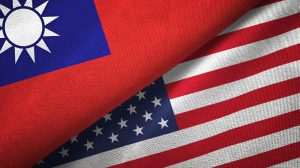China on Wednesday sharply criticized a visit to Taiwan by a senior Pentagon official amid a string of high profile exchanges between Washington and Taipei.
Asked about the reported visit by Michael Chase, the U.S. deputy assistant secretary of defense for China, Taiwan Affairs Office spokesperson Zhu Fenglian said China “resolutely opposes any official interaction and military collaboration” between the U.S. and Taiwan.
Efforts by Taiwan’s ruling Democratic Progressive Party to cement the island’s independence with foreign assistance are “doomed to failure,” Zhu told reporters.
China considers Taiwan part of its territory to be brought under its control by force if necessary, and has been stepping up its military and diplomatic harassment. The sides split amid civil war in 1949, and China’s authoritarian Communist Party has never ruled the island.
A Pentagon spokesperson did not comment directly on Chase’s visit, repeating that “our commitment to Taiwan is rock-solid and contributes to the maintenance of peace and stability across the Taiwan Strait and within the region.” Taiwan’s Ministry of Foreign Affairs has said it had no information about any such visit.
Chinese Foreign Ministry spokesperson Wang Wenbin said a “new round of tensions” in the Taiwan Strait was a result of the Taiwanese authorities’ attempts to “seek independence with U.S. support, as well as the U.S. intention to contain China with Taiwan.”
“We urge the U.S. to … stop any form of official U.S.-Taiwan contacts, stop meddling in the Taiwan issue and stop creating new factors of tension in the Taiwan Strait,” Wang said at a daily briefing.
Tensions between the United States and China again ratcheted up last month after Washington accused Beijing of sending a spy balloon that was shot down over the U.S. East Coast. Secretary of State Antony Blinken canceled a trip to Beijing in the wake of the incident.
A delegation of U.S. lawmakers visiting Taiwan met on Tuesday with President Tsai Ing-wen, who said she looked for increased cooperation on issues from security to climate change.
On Monday, the delegation met with the head of the legislature as part of their five-day visit. They include Reps. Ro Khanna of California, Tony Gonzales of Texas, Jake Auchincloss of Massachusetts, and Jonathan Jackson of Illinois.
The congressional team held talks with Taiwan Semiconductor Manufacturing Company’s founder Morris Chang, considered the father of the island’s world-leading microchip industry that is now investing heavily in U.S. production.
Khanna and Auchincloss are both members of the new House select committee focused on competition with China.
The committee’s chair, Rep. Mike Gallagher of Wisconsin, also traveled to Taiwan over the weekend, in a visit that he kept secret until after his return. “Gallagher, well aware of the furor caused by [then-House Speaker] Pelosi’s visit, said he deliberately kept his own visit quiet to have more productive meetings,” the Washington Post reported after an interview with the congressman.
Amid the flurry of exchanges, Taiwan’s Foreign Minister Joseph Wu and head of the National Security Council Wellington Koo were in Washington on Tuesday for what are believed to be security meetings.
They were filmed by Taiwan’s private TVBS television station entering the offices of the American Institute in Taiwan (AIT), the body the United States uses to oversee relations with Taiwan in lieu of formal diplomatic ties. Washington cut formal relations in 1979 in order to establish ties with Beijing, but remains the island’s chief political and military ally.
On the U.S. side, the meeting is believed to have included Deputy Secretary of State Wendy Sherman, Principal Deputy National Security Adviser Jon Finer, Assistant Secretary of State for East Asian and Pacific Affairs Daniel Kritenbrink, Deputy Assistant Secretary of State for China and Taiwan Rick Waters, and Assistant Secretary of Defense for Indo-Pacific Security Affairs Ely Ratner. Neither Taiwan nor the United States has officially confirmed the meeting.
China has increasingly lashed back at the increase in exchanges with Taiwan by officials and elected representatives from the United States and other democratic nations. China’s campaign of diplomatic isolation has left Taiwan with just 14 formal allies, although it retains robust unofficial relations with dozens of other countries.
Last Thursday, China imposed trade and investment sanctions against Lockheed Martin Corp. and Raytheon Technologies Corp.’s Raytheon Missiles and Defense, barring them from importing goods into China or making new investments in the country.
The Ministry of Commerce declared they had been added to the “unreliable entity” list of companies whose activities are restricted because they might endanger national sovereignty, security or development interests. It wasn’t clear what impact the penalties would have.

































